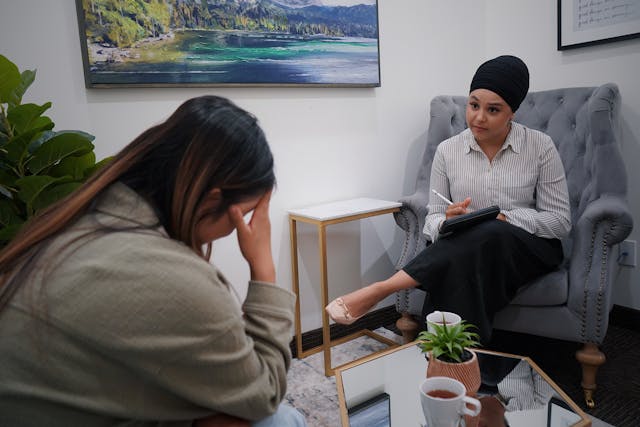What is cognitive behavioral therapy (CBT)?
Cognitive behavioral therapy (CBT) is a powerful form of therapy that empowers individuals to manage their mental health problems. It works by teaching you to recognize negative thought patterns and behaviors contributing to emotional distress. CBT emphasizes the connection between your thoughts, feelings, and actions. By identifying and changing unhelpful thinking patterns, you can experience positive shifts in both emotions and behaviors.
This collaborative approach involves working with a therapist to challenge the validity of these negative thought patterns and develop more constructive ways of thinking. CBT primarily focuses on present challenges and equips you with life skills training to navigate future situations. It's a widely used and evidence-based approach for treating a variety of mental health conditions, including anxiety disorders, depression, phobias, and more.
What is psychoeducation in therapy?
Building upon the principles and life skills of CBT, psychoeducation is a therapeutic intervention that equips individuals with knowledge and understanding about their specific mental health condition. Often employed within CBT frameworks, psychoeducation empowers patients to participate actively in their treatment journey.
Here's how psychoeducation connects to CBT:
- Understanding the "why": Psychoeducation addresses the "why" behind negative thought patterns and behaviors. By learning about their condition's underlying causes and symptoms, individuals can better understand their emotional responses and develop a sense of control over their mental health.
- Empowering informed decisions: Psychoeducation equips patients with the knowledge to make informed decisions about their treatment plans. This collaborative approach fosters trust and a sense of agency in the therapeutic process.
- Promoting self-management: By gaining insight into their condition, individuals can develop self-management skills to cope with symptoms and prevent relapse. This empowers them to take an active role in maintaining their mental well-being beyond therapy sessions.
In essence, psychoeducation serves as a foundational element within CBT, equipping individuals with the knowledge and tools necessary to manage their mental health effectively.
What is the purpose of psychoeducation?
Following the thread from CBT and psychoeducation's role within it, let's delve deeper into the specific purposes psychoeducation serves in therapy. By equipping individuals with knowledge about their mental health condition and treatment options, psychoeducation aims to achieve several key objectives:
- Reduce stigma and fear: Mental health conditions can be shrouded in misconceptions. Psychoeducation helps to dispel myths and normalize these conditions, fostering a sense of understanding and reducing anxiety associated with them.
- Increase self-awareness: By learning about the symptoms, triggers, and early warning signs of their condition, individuals can develop greater self-awareness. This empowers them to identify potential challenges and proactively implement coping mechanisms.
- Promote positive treatment outcomes: Psychoeducation fosters a collaborative environment where patients understand the rationale behind treatment approaches. This increased knowledge and buy-in contribute to better adherence to treatment plans and, ultimately, positive treatment outcomes.
In essence, psychoeducation serves as a cornerstone of effective therapy. Empowering individuals with knowledge and self-awareness paves the way for more effective coping mechanisms, improved treatment outcomes, and, ultimately, a path toward better mental health outcomes.
Types of Psychoeducation
Let's explore the various ways this therapeutic intervention can be delivered. The format and approach of family psychoeducation can vary depending on the specific needs of the individual and the treatment setting. Here's a breakdown of some common types of psychoeducation:
Individual therapy
Psychoeducation seamlessly integrates into individual therapy sessions. Therapists tailor information to address each client's specific needs and learning styles, ensuring a personalized approach to knowledge acquisition. This empowers individuals to develop a deeper understanding of their specific mental health diagnosis or condition and implement effective coping skills.
Group therapy
Group psychoeducation sessions can be a powerful platform for psychoeducation. Individuals learn from each other's experiences, share insights, and gain support from a community facing similar challenges. This fosters a sense of belonging and reduces feelings of isolation. Carepatron offers a variety of resources to streamline group therapy sessions, including customizable CBT treatment plan templates and CBT worksheet templates.
Family education
Psychoeducation can extend beyond the individual to include family members. By equipping families with knowledge about their loved one's condition, they can provide informed support during the treatment process and contribute to a more positive and supportive recovery environment. This improved family members' dynamic can significantly enhance treatment outcomes.
Psychoeducational workshops
Educational workshops offer a great way to disseminate information about mental health conditions to a broader audience. These workshops can raise awareness, reduce the stigma associated with mental illness and health challenges, and empower individuals to seek help if needed. They play a crucial role in promoting mental health literacy within communities.
Online resources
The internet offers many psychoeducational resources, including websites, support groups, and educational videos. While these resources can provide valuable information, it's essential to ensure they are credible and evidence-based. Therapists can guide clients toward reputable online resources to supplement their in-person sessions.
How effective is Psychoeducation?
Psychoeducation as a therapeutic intervention for mental disorders has its roots in the 20th century when it was initially applied to schizophrenia treatment. Over the years, its application has expanded to various mental health conditions, including bipolar disorder, depression, anxiety, and PTSD, among others.
Research has consistently supported psychoeducation's effectiveness. A seminal study by Poplawska et al. (2004) demonstrated its efficacy in improving outcomes for patients with schizophrenia. Further, a meta-analysis by Petretoo et al. (2013) reinforced these findings, indicating that psychoeducation significantly reduces relapse rates and hospital readmissions while improving medication adherence and patient knowledge of their condition.
More recent studies continue to affirm its value. For instance, Stafford et al. (2013) found that psychoeducation for bipolar disorder patients not only improves their understanding of the illness but also helps stabilize mood swings. In the realm of anxiety and depression, Sarkhel et al. (2020) have shown that psychoeducation can reduce symptoms and prevent relapse.
The scope of psychoeducation has evolved, incorporating modern technologies to widen access. Digital psychoeducation platforms have been studied for effectiveness, with Kim et al. (2018) finding positive results for such interventions in managing chronic illnesses.
In summary, psychoeducation is a well-established, research-backed resource that empowers patients and facilitates better clinical outcomes across a spectrum of mental health disorders and conditions.
Why use Carepatron as your therapy software?
Optimizing your workflow and empowering effective patient care are priorities for any mental health professional. Carepatron's therapy EHR is designed to streamline your practice management and elevate the delivery of psychoeducation within your treatment options.
Carepatron offers a comprehensive suite of features specifically tailored to the needs of therapists. This includes tools for creating and sharing customizable psychoeducational materials, streamlining appointment scheduling and billing, and facilitating secure communication with patients. Additionally, Carepatron integrates seamlessly with various third-party applications, enhancing the overall functionality of your practice.
Ready to experience the benefits of Carepatron firsthand? Explore our therapy software solutions and discover how Carepatron can empower you to deliver exceptional mental healthcare!
References
Kim, J., Aryee, L. M. D., Bang, H., Prajogo, S. E., Choi, Y. K., Hoch, J. S., & Prado, E. L. (2022). Effectiveness of Digital Mental Health Tools to Reduce Depressive and Anxiety Symptoms in Low- and Middle-Income Countries: Systematic Review and Meta-Analysis (Preprint). JMIR Mental Health. https://doi.org/10.2196/43066
Petretto, D. R., Preti, A., Zuddas, C., Veltro, F., Rocchi, M. B. L., Sisti, D., Martinelli, V., Carta, M. G., & Masala, C. (2013). Study on psychoeducation enhancing results of adherence in patients with schizophrenia (SPERA-S): study protocol for a randomized controlled trial. Trials, 14(1), 323. https://doi.org/10.1186/1745-6215-14-323
Popławska, R., Czernikiewicz, A., Szulc, A., Galińska, B., Konarzewska, B., & Rudnik-Szałaj, I. (2004). The effectiveness of psychoeducation in schizophrenic and depressive patients--a preliminary report. Psychiatria Polska, 38(3), 433–442. https://pubmed.ncbi.nlm.nih.gov/15199653/
Sarkhel, S., Singh, O., & Arora, M. (2020). Clinical Practice Guidelines for Psychoeducation in Psychiatric Disorders General Principles of Psychoeducation. Indian Journal of Psychiatry, 62(8), 319–323. https://doi.org/10.4103/psychiatry.indianjpsychiatry_780_19
Stafford, N., & Colom, F. (2013). Purpose and effectiveness of psychoeducation in patients with bipolar disorder in a bipolar clinic setting. Acta Psychiatrica Scandinavica, 127(442), 11–18. https://doi.org/10.1111/acps.12118



.jpg)

.jpg)
.jpg)
.jpg)



.jpg)

.jpg)


.jpg)





.jpg)

.jpg)
.jpg)
.jpg)